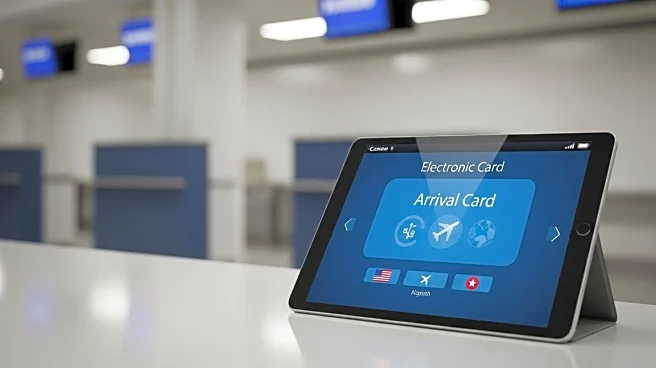What is the story about?
What's Happening?
Taiwan has introduced a new requirement for travelers entering the country, mandating the use of a 'digital arrival' card. This initiative, launched by the Ministry of the Interior National Immigration Agency Republic of China Taiwan (MINIA), aims to streamline the travel process and enhance security measures. Visitors, including those from the United States, must apply for the card three days prior to their arrival. The application process is free and requires submission of a valid passport, email address, occupation, phone number, and travel accommodation details. This move is part of a broader global trend where countries are modernizing their travel systems with increased oversight and tighter security protocols.
Why It's Important?
The implementation of digital arrival cards in Taiwan reflects a significant shift towards modernizing border management and enhancing security. For American travelers, this new requirement underscores the increasing emphasis on digital solutions in international travel. The U.S. is a major source of visitors to Taiwan, and this change could impact travel plans and necessitate adjustments in preparation for trips. The initiative aligns with global trends, as seen in Europe, where countries are adopting biometric data collection systems to combat fraud and terrorism. This development could influence future travel policies and security measures in other regions, potentially affecting international tourism and business travel.
What's Next?
As Taiwan rolls out the digital arrival card system, travelers will need to adapt to the new requirements, ensuring they complete the application process in advance. The success of this initiative may lead to further enhancements in Taiwan's border management systems, possibly incorporating additional biometric data collection methods. Other countries may observe Taiwan's approach and consider similar measures to improve their own travel security protocols. The global trend towards digital and biometric systems is likely to continue, with potential implications for privacy and data protection standards.
Beyond the Headlines
The introduction of digital arrival cards raises questions about privacy and data security, as travelers must provide personal information online. This development could spark discussions on the ethical implications of increased surveillance and data collection in travel. Additionally, the move may influence cultural perceptions of travel security and the balance between convenience and privacy. As countries adopt more digital solutions, the long-term impact on international relations and tourism dynamics could be significant.

















